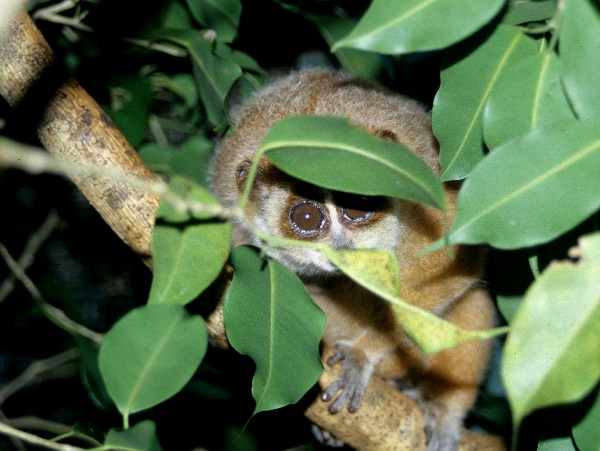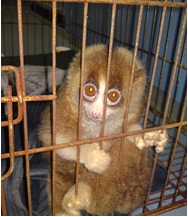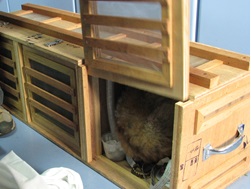Lorises find a new home in the UK
 An inquisitive Bengal Slow Loris!
An inquisitive Bengal Slow Loris!Three lorises have started their new life in Europe, after arriving at the Rare Species Conservation Centre (RSCC) in Kent, UK on the 13th April, 2011. The RSCC runs an ex-situ conservation breeding project for the species.
The two Bengal Slow Lorises (Nycticebus bengalensis) and one Pygmy Loris (Nycticebus pygmaeus) are both species native to the rainforests of Southeast Asia.
 A Pygmy Loris in its enclosure at KFBG
A Pygmy Loris in its enclosure at KFBGANIMAL PROFILE
Originally found as stray animals, the two Bengal Slow Lorises were transferred to our Wild Animal Rescue Centre (WARC) by the Agriculture, Fisheries and Conservation Department (AFCD), and, the Society for the
Prevention of Cruelty to Animals (SPCA) in 2008 and 2009, respectively. The Pygmy Loris was born in captivity at KFBG in 2006 from parents that had been rescued earlier by the AFCD in 2000. The father of the Pygmy Loris had actually joined the RSCC conservation programme in 2008.

WILD POPULATION IN DANGER
Bengal Slow Lorises and Pygmy Lorises are nocturnal tree-dwelling animals. Their wild populations are under threat from the rapid loss of habitat due to deforestation, and the widespread illegal harvest from the wild for the medicinal trade. Their fluffy and adorable appearance causes them further problems, as they become popularised for the pet trade. Many animals actually die during confinement and transportation.
Since its establishment in 1994, the Rescue Centre has received over 30 lorises. Most of them were either abandoned pets or animals confiscated from illegal wildlife trades.

CONSERVATION STATUS
Both species are listed as Vulnerable by the International Union for the Conservation of Nature (IUCN) Red List Category (in 2008), and, have been cited in Appendix I of the Convention on International Trade in Endangered Species of Wild Fauna and Flora (CITES), since September 2007. This should ban all international trade in these animals.
HOW CAN YOU HELP?
You can help by not buying wildlife as pets. If you discover any illegal wildlife trading activities, please report them to the AFCD at (852) 2150 6978 or (852) 1823 (hotline); or KFBG at (852) 2483 7136 / (852) 6713 9881.
You can learn more about the illegal trade of lorises at:
You may download the PDF of this article from here.


